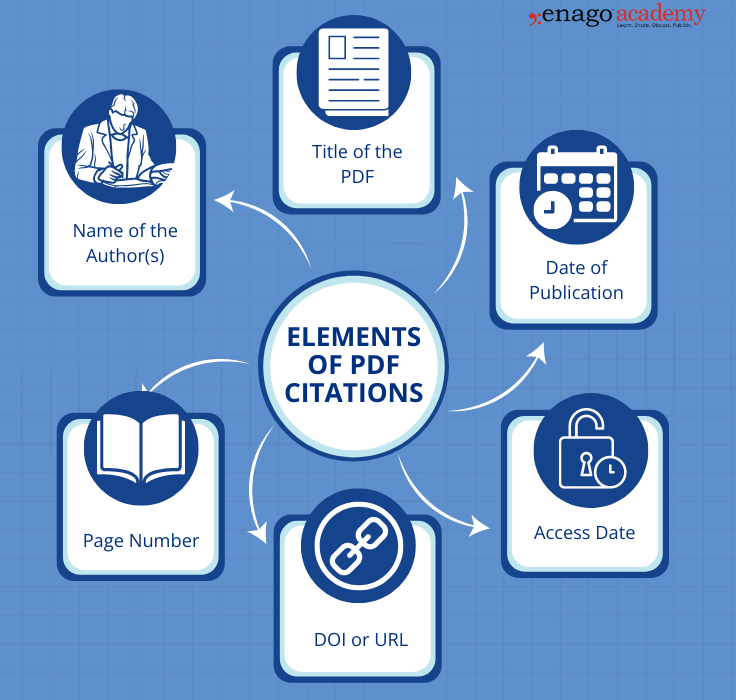How to Effectively Cite a PDF (APA, MLA, AMA, and Chicago Style)

The pressure to “publish or perish” is a well-known reality for academics, striking fear into the hearts of researchers worldwide. At the core of this high-stakes environment is the critical importance of effectively citing your sources. The art of citation is far more than just a formality — it is a fundamental pillar upon which the credibility and authority of your research rests.
Proper citation, across a variety of style formats, demonstrates to editors, reviewers, and readers that you take seriously the need to give credit where it is due. This attention to detail commands respect, as it shows you do not shy away from rigorously documenting your sources, even when citing something as common as a PDF file.
By approaching this scholarly practice with diligence and care even when citing PDFs, you position your work to be taken seriously and respected by the scholarly community.
Importance of Citing a PDF
In today’s digital world, PDFs are frequently used as reference materials, encompassing a variety of content such as journal articles, books, newspapers, reports, and more. Properly citing a PDF is academic work because it serves multiple functions and provides various benefits. The benefits of citing a PDF include:
Elements of PDF Citation
Before you begin citing the PDF that you have accessed online for your research work you need to note down few essential elements required to accurately cite them. They include:

You may also require other additional details including volume number and edition depending on the type of PDF you cite. While the elements of a PDF citation may remain constant, the structure may vary depending on the citation styles.
Different Citation Styles and Their Use
The choice of citation style is often determined by the discipline or the publication requirements. The most commonly used citation styles and their recommended applications are:
1. MLA (Modern Language Association)
Primarily used in the humanities, including literature, languages, and cultural studies.
2. APA (American Psychological Association)
Widely adopted in the social sciences, such as psychology, education, and business.
3. AMA (American Medical Association)
The preferred style for the field of medicine and life sciences.
4. Chicago
Commonly used in historical research and publications.
Adhering to the appropriate citation style depending on your requirement is crucial because:
1. Ensures consistency and uniformity throughout the document, aiding in the ease of locating and verifying sources.
2. Reflects the priorities and preferences of different disciplines, which may emphasize specific details or formatting conventions.
3. Demonstrates respect for the conventions and norms of the academic community, enhancing the credibility and professionalism of the work.
4. Reduces the risk of rejection or criticism because of adherence to specific formatting guidelines or preferences of publications or journals
5. Maintains academic integrity, clarity, and adherence to disciplinary standards.
Citing a PDF (APA, MLA, AMA, and Chicago Style)
Access the correct citation formats for PDFs in APA, MLA, AMA, and Chicago Style, along with solutions for scenarios like missing author names by looking at examples:
 By investing the time and effort to master this essential skill of citing a PDF, you’ll not only safeguard your academic integrity but also elevate the credibility and impact of your research.
By investing the time and effort to master this essential skill of citing a PDF, you’ll not only safeguard your academic integrity but also elevate the credibility and impact of your research.
As you embark on your scholarly journey, embrace the power of proper citation. Let it be the mark of your dedication to the pursuit of knowledge. In doing so, you’ll not only uplift your own academic success but also contribute to the broader advancement of your field.
Frequently Asked Questions
How to cite a PDF found online?▼
To cite a PDF found online, include the following elements in your citation: author(s) name, title of the PDF, publication date, page numbers (if applicable), DOI/URL, and the date you accessed the PDF. The citation style (APA, MLA, Chicago, etc.) will dictate the specific format. For example, in APA style: Author's Last Name, First Initial. Middle Initial. (Year). Title of document [PDF]. Site Name. URL
How to cite a PDF with multiple authors?▼
When citing a PDF with multiple authors, list all authors' names in the citation. For instance, in APA style: Author1 Last Name, First Initial. Middle Initial., Author2 Last Name, F. M., & Author3 Last Name, F. M. (Year). Title of document. Site Name. URL
How are in-text citations for PDFs different?▼
In-text citations for PDFs follow the same principles as citations for other sources. Include the author's last name and publication year within parentheses, e.g., (Author Last Name, Year).
What information is required to cite a PDF?▼
To cite a PDF, you'll typically need the author(s) name, title of the PDF, publication date, page numbers (if applicable), DOI/URL, and access date. Additional details such as volume number or edition might be required depending on the citation style.
Is there a universal way to cite PDFs?▼
No, there isn't a universal way to cite PDFs. The citation format varies based on the style guide (APA, MLA, Chicago, etc.) you are using. Each style has its specific requirements for citing PDFs, and it's essential to follow these guidelines for accuracy and consistency in your citations.















